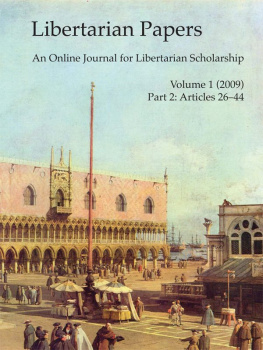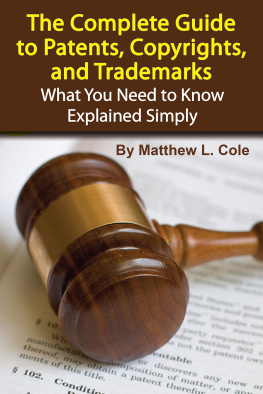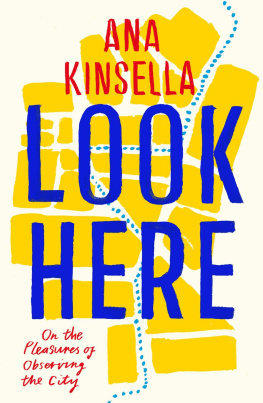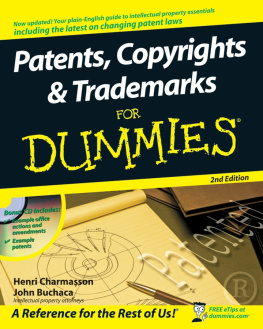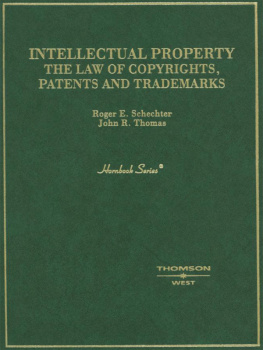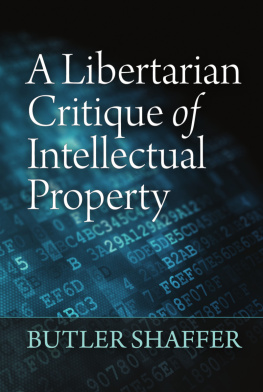Against Intellectual Property first appeared as part of the symposium Applications of Libertarian Legal Theory, published in the Journal of Libertarian Studies 15, no. 2 (Spring 2001).
Copyright 2008 Ludwig von Mises Institute
For information, write the Ludwig von Mises Institute, 518 West Magnolia Avenue, Auburn, Alabama 36832, U.S.A
AGAINST INTELLECTUAL PROPERTY
N. Stephan Kinsella


Ludwig von Mises Institute
Auburn, Alabama
AGAINST INTELLECTUAL PROPERTY
PROPERTY RIGHTS: TANGIBLE AND INTANGIBLE
A ll libertarians favor property rights, and agree that property rights include rights in tangible resources. These resources include immovables (realty) such as land and houses, and movables such as chairs, clubs, cars, and clocks.
Further, all libertarians support rights in ones own body. Such rights may be called self-ownership as long as one keeps in mind that there is dispute about whether such body-ownership is alienable in the same way that rights in homesteadable, external objects are alienable. In any event, libertarians universally hold that all tangible scarce resourceswhether homesteadable or created, immovable or movable, or our very bodiesare subject to rightful control, or ownership, by specified individuals.
As we move away from the tangible (corporeal) toward the intangible, matters become fuzzier. Rights to reputations (defamation laws) and against blackmail, for example, are rights in very intangible types of things. Most, though not all, libertarians oppose laws against blackmail, and many oppose the idea of a right to ones reputation.
Also disputed is the concept of intellectual property (herein referred to as IP). Are there individual rights to ones intellectual creations, such as inventions or written works? Should the legal system protect such rights? Below, I summarize current U.S. law on intellectual property rights. I then survey various libertarian views on IP rights, and present what I consider to be the proper view.
SUMMARY OF IP LAW
Types of IP
Copyright
While a copyright may be registered to obtain legal advantages, a copyright need not be registered to exist. Rather, a copyright comes into existence automatically the moment the work is fixed in a tangible medium of expression, and lasts for the life of the author plus seventy years, or for a total of ninety-five years in cases in which the employer owns the copyright.
Patent
(the previous term was seventeen years from date of issue).
Trade Secret
Trade secret protection is obtained by declaring that the details of a subject are secret. The trade secret theoretically may last indefinitely, although disclosure, reverse-engineering, or independent invention may destroy it. Trade secrets can protect secret information and processes, e.g., compilations of data and maps not protectable by copyright, and can also be used to protect software source code not disclosed and not otherwise protectable by patent. One disadvantage of relying on trade secret protection is that a competitor who independently invents the subject of anothers trade secret can obtain a patent on the device or process and actually prevent the original inventor (the trade secret holder) from using the invention.
Trademark
A trademark is a word, phrase, symbol, or design used to identify the source of goods or services sold, and to distinguish them from the goods or services of others. For example, the Coca-Cola mark and the design that appears on their soft drink cans identifies them as products of that company, distinguishing them from competitors such as Pepsi. Trademark law primarily prevents competitors
Many laymen, including libertarians, have a poor understanding of IP concepts and law, and often confuse copyrights, trademarks, and patents. It is widely, and incorrectly, believed that in the U.S. system, the inventor who files first at the patent office has priority over those who file later. However, the U.S. system is actually a first-to-invent system, unlike most other countries, which do have a first-to-file system for priority.
IP Rights and Relation to Tangible Property
As noted above, IP rights, at least for patents and copyrights, may be considered rights in ideal objects. It is important to point out that ownership of an idea, or ideal object, effectively gives the IP owners a property right in every physical embodiment of that work or invention. Consider a copyrighted book. Copyright holder A has a right to the underlying ideal object, of which the book is but one example. The copyright system gives A the right in the very pattern of words in the book; therefore, by implication, A has a right to every tangible instantiation or embodiment of the booki.e., a right in every physical version of the book, or, at least, to every book within the jurisdiction of the legal system that recognizes the copyright.
Thus, if A writes a novel, he has a copyright in this work. If he sells a physical copy of the novel to B, in book form, then B owns only that one physical copy of the novel; B does not own the novel itself, and is not entitled to make a copy of the novel, even using his own paper and ink. Thus, even if B owns the material property of paper and printing press, he cannot use his own property to create another copy of As book. Only A has the right to copy the book (hence, copyright).
Likewise, As ownership of a patent gives him the right to prevent a third party from using or practicing the patented invention, even if the third party only uses his own property. In this way, As ownership of ideal rights gives him some degree of controlownershipover the tangible property of innumerable others. Patent and copyright invariably transfer partial ownership of tangible property from its natural owner to innovators, inventors, and artists.
LIBERTARIAN PERSPECTIVES ON IP
The Spectrum
Libertarian views on IP range from complete support of the fullest gamut of IP imaginable, to outright opposition to IP rights. Most of the debate about IP concerns patent and copyright; as discussed below, trademark and trade secret are less problematic. Therefore, this article focuses primarily on the legitimacy of patent and copyright.
According to the natural-rights view of IP held by some libertarians, creations of the mind are entitled to protection just as tangible property is. Both are the product of ones labor and ones mind. Because one owns ones labor, one has a
natural law right to the fruit of ones labor. Under this view, just as one has a right to the crops one plants, so one has a right to the ideas one generates and the art one produces.
This theory depends on the notion that one owns ones body and labor, and therefore, its fruits, including intellectual creations. An individual creates a sonnet, a song, a sculpture, by employing his own labor and body. He is thus entitled to own these creations, because they result from other things he owns.
These commentators point out the many problems with conventional utilitarian and natural-rights arguments given to justify IP rights. These and other shortcomings of standard pro-IP arguments are surveyed below.
Utilitarian Defenses of IP
Advocates of IP often justify it on utilitarian grounds. Utilitarians hold that the end of encouraging more innovation and creativity justifies the seemingly immoral means of restricting the freedom of individuals to use their physical property as they see fit. But there are three fundamental problems with justifying any right or law on strictly utilitarian grounds.
Next page


